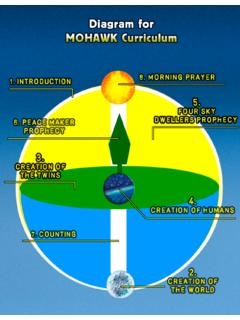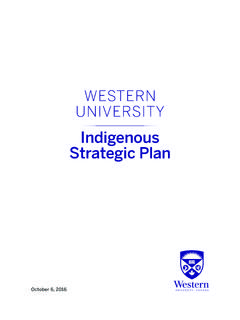Transcription of ACCOMMODATING INDIGENOUS LEGAL …
1 ACCOMMODATING INDIGENOUS LEGAL TRADITIONS Paper prepared by Lisa D. Chartrand For the INDIGENOUS Bar Association in Canada March 31, 2005 ACCOMMODATING INDIGENOUS LEGAL TRADITIONS TABLE OF CONTENTS Page Preface 2 Introduction 3 Chapter One - Characterizing INDIGENOUS LEGAL traditions 7 Chapter Two - Justifying Accommodation 11 1. INDIGENOUS LEGAL Traditions as Section 35 11 Aboriginal Rights 2. Accommodation as a Right Accorded to INDIGENOUS 13 Peoples in International Law 3. Accommodation in Order to Achieve Equality 16 4. Pluralism already Exists 18 Chapter Three Entrenching INDIGENOUS LEGAL Traditions 18 1.
2 INDIGENOUS Judicial Appointments 21 2. Harmonization of INDIGENOUS and non- INDIGENOUS Laws 25 3. Respect for INDIGENOUS Government and Governance 27 4. Institutional Reform 29 Conclusion 31 Bibliography 35 Acknowledgements 38 Preface On March 4, 2005, a one-day Forum was held in Ottawa to dialogue on the proper place of INDIGENOUS LEGAL traditions within the Canadian juridical Presenters included Aboriginal and non-Aboriginal LEGAL scholars, practitioners, and Aboriginal leaders from various regions across Canada. The combined knowledge and experience of these presenters demonstrate the solid basis for ACCOMMODATING INDIGENOUS LEGAL traditions alongside common law and civil law The theme and substance of this Discussion Paper is based on that shared knowledge, as well as materials and papers presented at the Forum.
3 Lisa D. Chartrand Winnipeg, MB March 2005 1 This gathering was held by the INDIGENOUS Bar Association, in conjunction with the Aboriginal Law Section of the Canadian Bar Association. 2 List of presenters appears in appendix. On behalf of the INDIGENOUS Bar Association, the writer wishes to express appreciation to the presenters for sharing this knowledge. 2 Introduction On April 19th, 2004, Prime Minister Paul Martin signaled Canada s willingness to embark on a new collaborative relationship with Canada s INDIGENOUS peoples. At the historic Canada-Aboriginal Peoples Roundtable he stated: We will ensure a full seat at the table as we have ensured today to Aboriginal communities and leaders. No longer will we in Ottawa develop policies first and discuss them with you later. This principle of collaboration will be the cornerstone of our new partnership.
4 The Prime Minister s statement has been interpreted as an opportunity to begin a process of reconciliation between INDIGENOUS and non- INDIGENOUS peoples. As aptly noted by Grand Chief Phil Fontaine, all efforts at reconciliation will require transformative change, which in turn will entail a multi-faceted approach to achieve both procedural and substantive reform . This includes the manner in which Canada addresses the constitutional rights of Aboriginal peoples, as well as the content of existing laws and policies. Transformative change can and should entail accommodation of INDIGENOUS LEGAL traditions within Canada s pluralistic state. In this Discussion Paper, the INDIGENOUS Bar Association proposes how INDIGENOUS LEGAL traditions can be accommodated within Canada s juridical framework. Accommodation of INDIGENOUS LEGAL traditions within Canada s LEGAL framework is a timely issue in terms of situating the proper place of INDIGENOUS peoples and their LEGAL traditions within Canada s pluralistic state.
5 In various regions of the country, 3citizens live according to the laws of both the common law or civil law systems. Many citizens also live according to the INDIGENOUS LEGAL traditions of the societies to which they belong. Given this reality, it is inaccurate to characterize Canada as bijuridical. Rather, this country is a multi-juridical state, where the distinct laws and rules of three systems come together within the geographic boundaries of one political territory. The INDIGENOUS peoples of Canada whose LEGAL traditions are referred to throughout this Discussion Paper include, among others, the historic and contemporary nations of the Innu, Mi kmaw, Maliseet, Cree, Montagnais, Anishinabek, Haudenosaunee, Salish, Kwakwaka wakw, Haida, Tsimshian, Gitk san, Tahltan, G wichin, Den , Inuit, and M tis peoples. 3 Just as with any of the various peoples of the world, the LEGAL traditions of these distinct societies and cultures are in many ways diverse from one another.
6 Notwithstanding this diversity, each of these peoples share a common experience that their INDIGENOUS LEGAL traditions are not reflected in Canada s multi-juridical state. Often the belief systems of INDIGENOUS and non- INDIGENOUS peoples are complementary to one another; in certain circumstances, they are diverse. Notwithstanding this diversity, it is important to acknowledge that none of these systems are superior to the others. In each case, the LEGAL traditions are unique 3 Borrows, John. INDIGENOUS LEGAL Traditions in Canada, Unpublished paper for IBA/CBA Forum on INDIGENOUS LEGAL Traditions. Ottawa, March 2005 at p. 10. 4and integral to the society in question, and are based on fundamental beliefs and values of the society. The proper place of INDIGENOUS peoples is not merely as subjects of either the common law or civil law LEGAL system, with their INDIGENOUS LEGAL traditions treated as insignificant, irrelevant and unenforceable.
7 As will be demonstrated in this Discussion Paper, true justice demands that Canada s juridical state make room for INDIGENOUS LEGAL traditions and that these traditions be acknowledged along with the common law and civil law systems. This Paper will begin with a descriptive discussion about INDIGENOUS LEGAL traditions. Through examples provided, it will be demonstrated that INDIGENOUS LEGAL traditions and systems of law both pre-dated and post-dated the arrival of Europeans and imposition of the common law and civil law systems of justice. More importantly, these examples will demonstrate the crucial role that INDIGENOUS LEGAL traditions played in the historic harmonization of relations between INDIGENOUS nations, as well as between INDIGENOUS nations and the European newcomers. This discussion will demonstrate that INDIGENOUS LEGAL traditions historically had a legitimate and valid role in the evolution of the Canadian state and that, in consideration of this history; INDIGENOUS LEGAL traditions should be embraced as an integral aspect of the country s juridical foundation.
8 5 Chapter two involves a discussion of the LEGAL and moral bases for recognizing the legitimacy of INDIGENOUS LEGAL traditions. First, drawing on principles of Canadian constitutional law, it will be demonstrated how INDIGENOUS LEGAL traditions can be characterized as existing Aboriginal and treaty rights, and that they therefore should be accorded constitutional protection and recognition under Section 35(1) of the Constitution Act, 1982. A second constitutional argument will be set out based on principles of equality as guaranteed by the Canadian Charter of Rights and Freedoms4 . It will be argued that Canada s pluralism warrants comparable accommodation of INDIGENOUS LEGAL traditions. Lastly, at the international level, the rights of INDIGENOUS peoples are progressively being recognized. As a party to these international agreements, it will be demonstrated how legally and politically, Canada is obligated to acknowledge and accommodate INDIGENOUS LEGAL traditions.
9 Meaningful accommodation of INDIGENOUS LEGAL traditions within the framework of the Canadian LEGAL system is an attainable goal. Drawing back to the means of securing space for INDIGENOUS LEGAL traditions in the Canada juridical system, the final chapter of this Discussion Paper will elaborate on four mechanisms that make this possible: Law reform, governance structures, public education, and institutional reform. Each is described with recommendations for incremental or immediate implementation. 4 Canadian Charter of Rights and Freedoms, s. 33, Part I of the Constitution Act, 1982, being Schedule B to the Canada Act 1982 ( ), 1982, c. 11 6 Chapter One - Characterizing INDIGENOUS LEGAL traditions Norms are a projection of the behaviors expected of members of a given society. The formation of social norms and mores, including those governing spiritual practices and traditions and those guiding relationships with other people and other forms of life evolved as part of INDIGENOUS peoples relationships with the land and its resources.
10 While these relationships may have been altered by an increasing emphasis first on a fur trade economy and then by the formation of a new society of non- INDIGENOUS immigrants, most INDIGENOUS communities continue into the present to practice and honor these traditional beliefs and values or INDIGENOUS LEGAL traditions. INDIGENOUS societies have practiced LEGAL pluralism in various forms well before the arrival of European settlers and colonists. These systems of law governed the conduct and behavior of individuals in relation to the land, as well as towards other members of the society. As an example, it is a fundamental belief of many INDIGENOUS societies that the Creator placed INDIGENOUS peoples on the earth to act as stewards of the Earth and its gifts. At its root, this belief system is based on the notion that mankind must therefore respect the living Earth and all of its resources, that living in harmony with the Earth and all mankind is the law.




